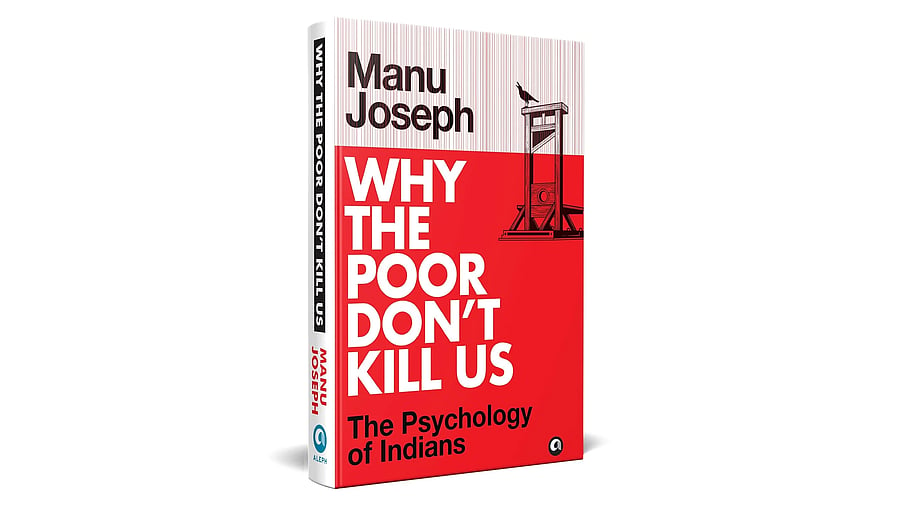
Why The Poor Don't Kill Us
Every system has its breaking point. In physics, every object has a threshold: stress creates strain, and strain creates fracture. Even the strongest steel yields when enough pressure is applied. But what about societies? What about the moment when inequality becomes so extreme that the social fabric should, by any reasonable measure, tear apart?
India operates far beyond any theoretical breaking point. The delivery rider knocks at your door, late on a 20-minute promise made by some algorithm, soaked through by a merciless monsoon. His phone, wrapped in a plastic cover, buzzes with the next order before he’s even handed you this one. You grumble about the delay, oblivious to the three flights of stairs he climbed while you sat in air-conditioned comfort, oblivious to the mathematics of his desperation: Rs 27 per delivery, minus petrol, minus phone bills, minus the platform’s cut.
The domestic worker who scrubs your floors lives in a room that would fit inside your bedroom closet. She wakes at four to catch the first local train, standing pressed against strangers for an hour to reach your neighbourhood by six. She’s already cleaned two other houses by the time she reaches yours, her back aching, her hands pruned from detergent and water.
The guard, the barber, the plumber, the gardener, the waiter — they all pass through your life like tools: necessary, invisible. Every day, millions of Indians serve people whose daily expenses exceed their monthly earnings. They clean toilets in homes worth crores and guard gates they’ll never pass through as guests. They see the waste, the abundance, the cars you drive, the trinkets you hoard. They see the thin contempt in your eyes.
The Genevan philosopher Jean-Jacques Rousseau wrote, “When the people shall have nothing more to eat, they will eat the rich”. Yet, in India, in a country where inequality has reached levels that would make Versailles blush, they don’t eat the rich. Instead, they serve them breakfast.
Why don’t they open the face of the guillotine and take power into their own hands? Why is it that the rich and the poor coexist peacefully? Manu Joseph’s Why The Poor Don’t Kill Us attempts to decode this miracle, to understand how a system so inherently unstable maintains its equilibrium.
India, he writes, is “a republic of nobodies,” the poor existing as “ancient people in modern times,” witnesses to a wealth they can never access but must daily serve. It’s a nation where a farmer’s daughter’s life (Rs 20,000 compensation) is worth less than the leopard that killed her (Rs 25,000 fine for killing it).
This republic operates by its own physics, its own laws of cause and effect. He observes: “In the best areas of London or New York, you pay a premium for what the city offers, and what the city offers is available to everyone. In India, it is the opposite. The city is the problem, and you pay to shut it out, along with most Indians of your ilk.”
But what keeps this impossible equation balanced? Joseph identifies several variables. The first is the performance — both genuine and calculated — of austerity by the wealthy. Mahatma Gandhi, after all, was a renunciate. Contemporary billionaires understand this well, too: Mukesh Ambani’s familiar cultural markers, Ratan Tata’s philanthropic gestures. Excess disguised as humility becomes easier to stomach.
Other deterrents lie within the system itself. The pathetic condition of Indian jails and judiciary ensures that many avoid even the idea of crime — for the poor, freedom is too fragile to risk losing in endless trials or rotting prisons. Joseph also skewers the false promise of higher education, which offers degrees as tickets to liberation.
Equally sharp is his treatment of activism. “Every Indian who is not poor is, inescapably, a poverty-eradication thinker. His insurmountable problem is finding a competent authority to whom to delegate this task.” “Across the ages, all of activism is just this — the second rung of a society fighting against the top rung in the name of a public cause.”
He is also keenly aware of how envy works. The poor rarely measure themselves against the rich, for comparisons are made sideways. The maid envies the driver who earns slightly more, the driver envies the clerk, the clerk the manager, the manager the director. Discontent, instead of shooting upward, dissolves into local rivalries.
As a writer, Joseph is funny, brilliantly observant. But the book itself meanders, strings together anecdotes rather than building arguments, sidesteps history and economics, and leans heavily on instinct. It is less a study than an extended editorial column: witty yet seldom cohesive.
Eventually, the question posed by the book has no easy resolution. The delivery rider will knock again tomorrow. The maid will continue scrubbing floors costlier than her annual salary. The guard will keep protecting wealth he’ll never possess.
And so the mathematics of desperation will continue, the physics of inequality will remain.